In recent events, we are witnessing a disturbing trend where the voices of artists and the ideals of free expression are being ruthlessly silenced under the guise of political correctness and corporate compliance. The decision of ABC News Studios to cancel the red carpet event for Lilith Fair’s documentary premiere is emblematic of a troubling shift—an erosion of the cultural space necessary for open debate and artistic protest. More than a mere scheduling conflict, this action signals a broader capitulation by media giants to political pressures and ideological conformity, sacrificing critical cultural dialogue at the altar of corporate interests and perceived social harmony.
Sarah McLachlan’s poignant remarks serve as a stark reminder of what is at stake. Her acknowledgment of the ongoing assault on women’s rights, trans rights, and free speech underscores a collective anxiety that the progressive gains achieved over decades might be irreversibly reversed. However, her call for resilience and unity reveals a deeply nuanced understanding—a recognition that art and music are not just entertainment, but powerful tools for challenging injustice and fostering empathy. By choosing to boycott and stand in solidarity rather than perform under oppressive circumstances, McLachlan and her colleagues embody a resistance rooted in moral conviction. Their decision reflects a refusal to accept the status quo of censorship, and instead, an insistence on using their platform to advocate for freedom and openness.
Suppressing Free Speech Under the Pretext of Public Welfare
The controversy surrounding Jimmy Kimmel’s suspension highlights a hyper-partisan climate where even humor and debate are caught in the crossfire of ideological battles. Critics argue that targeting Kimmel’s show over comments related to a tragic incident—an activist’s murder at Utah Valley University—represent an assault on free speech itself. When the very platforms intended to serve as forums for open discussion are undermined by political motives, democracy suffers. The disproportionate backlash against Kimmel, fueled by his critique of political figures and his willingness to address uncomfortable truths, exemplifies the dangerous tendency to silence dissenting voices in the name of civility or social decorum.
Furthermore, the involvement of the FCC warnings and the marginalization of progressive critiques threaten to turn the media landscape into an echo chamber, eroding the pluralism that is essential for a healthy democracy. The narrative often presented by those in power is wielded as a weapon to stifle criticism, creating a chilling effect that discourages artists, comedians, and journalists from speaking truth to power. This state of affairs not only undermines free expression but also risks transforming media and culture into tools of propaganda, stripping away the fundamental rights upon which democratic societies are built.
The Illusion of Unity in the Face of Cultural Suppression
The response of Lilith Fair’s artists—choosing to cancel performances rather than capitulate—demonstrates a profound understanding: that unity in the face of repression requires more than superficial harmony. Their stand is not just symbolic; it is an affirmation that art remains a site of resistance, a space where societal tensions can be aired without fear of censorship. McLachlan’s emphasis on kindness and empathy as pathways toward a more inclusive society is insightful but also optimistic in a context where forces are actively working to undermine those very principles.
While some may see these acts of defiance as marginal, they are, in reality, critical acts of rebellion that challenge the normalized silence imposed by corporate and political authorities. The culture war is not merely fought in legislatures or social media—these battles are fought in concert halls, on television screens, and through public protests. The idea that art can serve as a bridge toward shared humanity is not naive; it is essential. However, that bridge can only exist if artists, activists, and ordinary citizens refuse to accept the restrictions placed upon them. The fight for free speech is intertwined with the fight against authoritarian tendencies that seek to silence dissent under the guise of protecting social harmony. Recognizing this, we must be vigilant—arts and freedom of speech should never be collateral damage in the pursuit of political or corporate expediency.


Leave a Reply